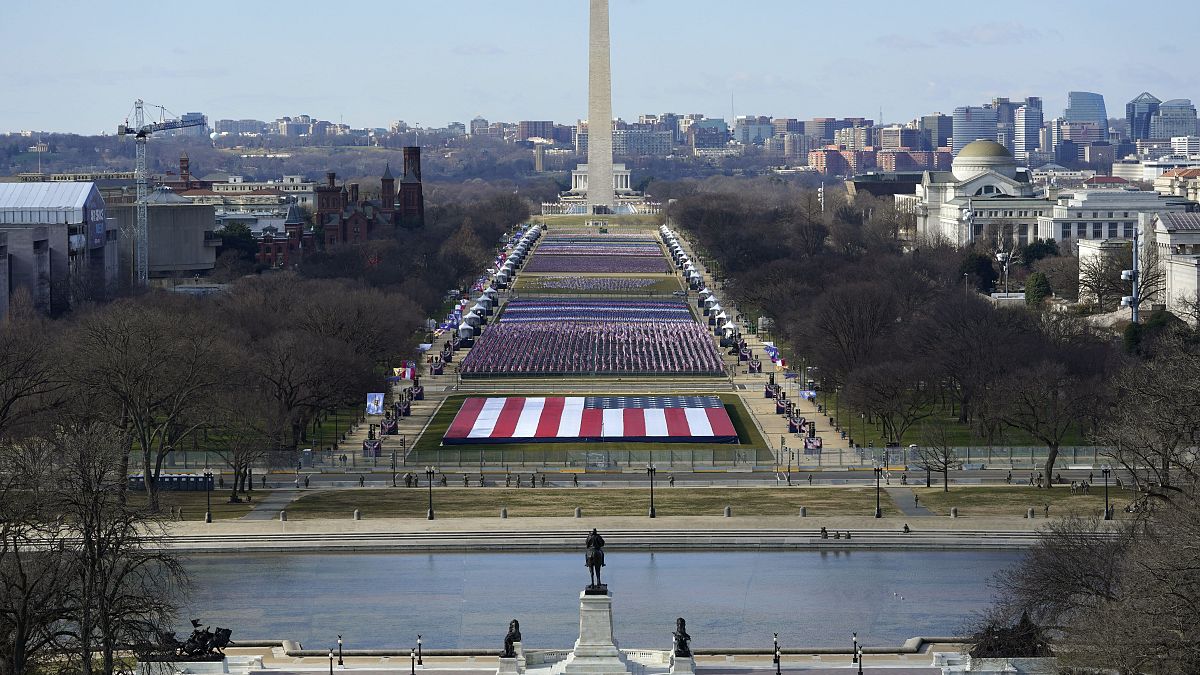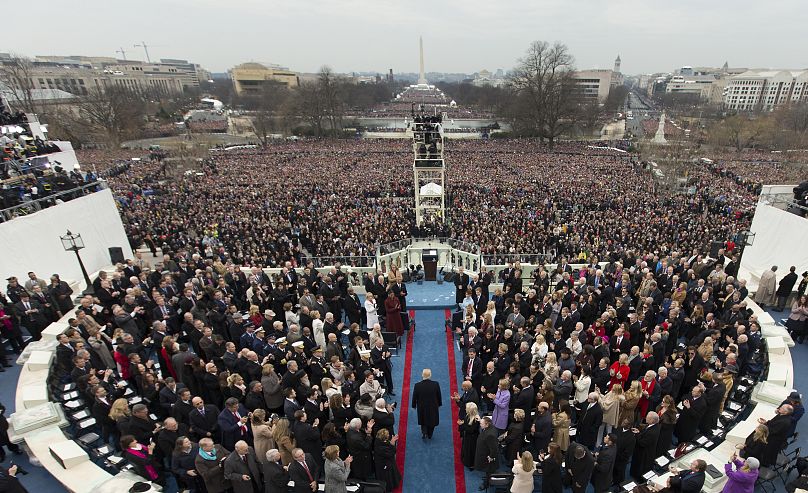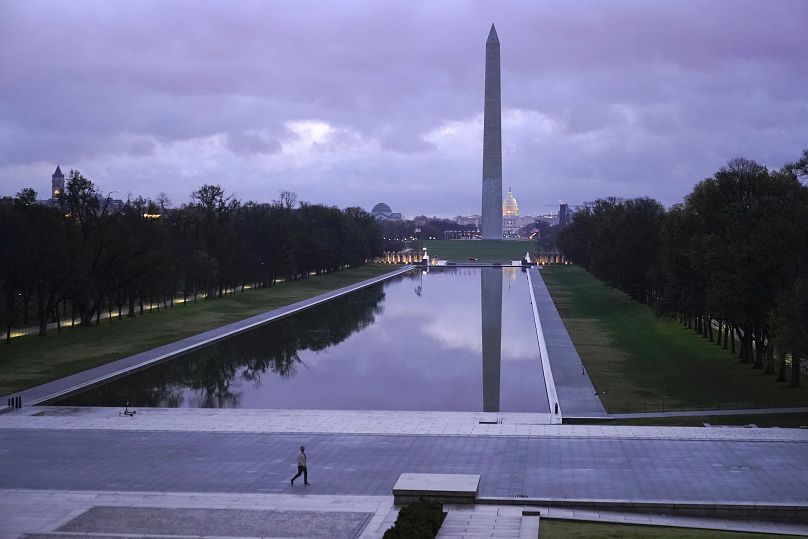Joe Biden's inauguration is happening at a time of increased polarisation in the US and amid a pandemic that has killed more than 370,000 Americans.
US President-elect Joe Biden will be inaugurated on Wednesday (January 20) in a ceremony that will officially mark the end of the transition period from Donald Trump.
But this year will be different. That's down to the COVID-19 pandemic but also the polarisation of US politics.
Here’s a look at five key differences that make this year's inauguration stand out.
The Biden inauguration will take place at 5:30 pm CET. Watch it on euronews.com
Public health measures instituted amid COVID-19 pandemic
The large crowds that normally descend on Washington DC for a presidential inauguration might look very different this year, with social distancing expected to be enforced in order to curb the spread of COVID-19.
Inauguration crowd size already made news in 2017 for the Trump administration, with the US president’s first press secretary Sean Spicer insisting that the inaugural crowds for Trump were the largest ever despite photos appearing to show otherwise.
This year, the presidential inaugural committee for Biden is encouraging people to join virtually instead of in person, “urging the public to refrain from any travel and participate in the inaugural activities from home”.
Around 200,000 flags were installed on the National Mall to represent Americans and tickets to the event are quite limited with seats spaced out on the inauguration stage.
There will be a "virtual parade" to mark the change of power that will "feature diverse, dynamic performances in communities across the country," the committee said in a statement. Then, university student drumlines from Joe Biden and Kamala Harris' alma maters will escort them as part of the parade.
The end of the day will be marked by a virtual programme airing on major US television networks called "Celebrating America" and featuring multiple celebrities and performers.
Donald Trump is the fourth US president to boycott successor's inauguration
US President Donald Trump has said he will not attend the inauguration of his successor, breaking from tradition.
Typically, presidents attend the inauguration as part of handing over power to the next commander-in-chief.
In 2017, former President Barack Obama and Democratic candidate Hillary Clinton, who had lost the election, attended Trump's inauguration.
Trump is the fourth US president to boycott a successor's inauguration and the first to do so since Andrew Johnson refused to attend Ulysses S. Grant's ceremony in 1869.
John Adams also skipped Thomas Jefferson's 1800 inauguration, vacating the White House at four in the morning and John Quincy Adams skipped Andrew Jackson's inauguration in 1829.
Two other presidents missed out on their successor's inauguration, including Martin Van Buren for unknown reasons and Woodrow Wilson for health reasons.
Trump will also not be present to greet Biden when he moves into the White House.
Tensions after Capitol riot forced lawmakers to evacuate building
The inauguration comes at a time of deep polarisation in the United States and tensions remain high after rioters stormed the US Capitol while Congress was certifying Joe Biden's electoral victory.
Five people died in the chaos that saw the Capitol police overrun by Trump supporters who entered congressional offices and forced lawmakers to flee to an undisclosed secure location.
Two pipe bombs were also found outside the Democratic and Republican National Committee headquarters, in what lawmakers called a dark day in the country's history.
President Trump had repeated baseless claims that election fraud was committed for weeks after his loss.
Democrats also impeached Donald Trump for a second time last week for inciting the "insurrection" at the Capitol.
Heightened security amid inauguration events
A presidential inauguration is always a high-security event, with security officials stating that preparations have been underway for a long time.
But US officials are worried about far-right groups protesting during the events.
Around 25,000 members of the National Guard will be present in Washington D.C. for the event, with the Pentagon having vetted members for any ties to far-right extremists, the AP reported.
FBI Director Christopher Wray said last week the FBI was following up on chatter about armed protests.
"We’re concerned about the potential for violence at multiple protests and rallies planned here in D.C. and at state Capitol buildings around the country in the days to come that could bring armed individuals within close proximity to government buildings and officials," Wray said.
Acting chief of the US Capitol Police Yogananda Pittman said in a statement: "We have comprehensive, coordinated plans in place to ensure the safety and security of the Congressional community and the upcoming Presidential Inauguration. There will be no public access to the Capitol Grounds during the Inauguration, and the event will go on as scheduled."
A day after Trump's 2017 inauguration, an estimated several million people marched in Washington and around the US to protest the new president as part of the Women's March, which remained peaceful.
Most of downtown Washington DC is restricted as part of the high security preparations, with local officials encouraging people to avoid the city.
Honouring victims of COVID-19 after a difficult year in the US in show of 'unity'
The theme of this year's inauguration is "America United", the inaugural committee announced, stating that the incoming US president was committed to "healing" and "bringing the country together".
Victims of COVID-19 were set to be honoured the day before Biden's inauguration, in a ceremony around the Lincoln Memorial Reflecting Pool.
"It will be the first-ever lighting around the Reflecting Pool to memorialise American lives lost," the inaugural committee said.
After the inauguration, Biden will join former Presidents Barack Obama, George W. Bush and Bill Clinton to lay a wreath on the Tomb of the Unknown Soldier in Arlington National Cemetery in one of his first acts as president.
The day after his inauguration, Biden will host a Virtual Presidential Inaugural Prayer Service at the Washington National Cathedral.
COVID-19 has infected more than 24.1 million people in the US and killed more than 399,000 in the country.


